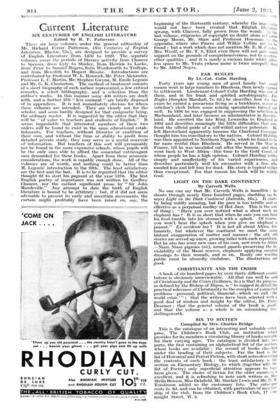Current Literature
SIX CENTURIES OF ENGLISH LITERATURE Edited by R. F. Patterson
These six large volumes, under the general editorship of Mr. Richard Ferrar Patterson, (Six Centuries of English Literature. Blackie, 75s.), are designed to provide a survey of English Literature from 1370 to 1920. The separate volumes cover the periods of literary activity from Chaucer to Spenser, from Lyly to Shirley, from Herrick to Locke, from Prior to Samuel Rogers, from Wordsworth to Trollope, and from Meredith to Rupert Brooke. Introductions are contributed by Professor W. L. Renwick, Mr. Peter Alexander, Professor L. C. Martin, Mr. Stephen Gwynn, M. Emile Legouis and Mr. G. K. Chesterton. The method of treatment consists of a short biography of each author represented, a few critical remarks, a select bibliography, and a selection from the author's works. In this manner some 400 writers are dealt with, and a further 370 "less eminent" are briefly disposed of in appendices. It is not immediately obvious for whom these volumes are intended. - They are clearly not for the scholar, and seem hardly designed for that emigmatic being, the ordinary reader. It is suggested by the editor that they will be "of value to teachers and students of English." It seems improbable that interested members of these two orders will be found to exist in the same educational estab- lishments. For teachers, without libraries or erudition of their own, and without the time or ability to profit from detailed private study, they may serve as a useful reservoir of information. But teachers of this sort will presumably not be found in the more expensive schools, whose pupils will be the only ones able to afford the somewhat extravagant sum demanded for these books. Apart from these economic considerations, the work is capably enough done. All of the volumes are of worth, and nothing could be better than M. Legouis' introduction to the fifth. The least satisfactory are the first and the last. It is to be regretted that the editor thought fit to start his pageant at the year 1370. The first English poetry of importance was not- written by Geoffrey Chaucer, nor the earliest significant prose by "Sir John Mandeville." Any attempt to date the birth of English literature is bound to be arbitrary : but, if it did not seem advisable to present its early and uncertain movements, the curtain might profitably have been raised on, say, the beginning of the thirteenth century, 'whereby the imp,;2ssien would not have been created that English literature sprang, with Chaucer, fully, grown from the womb. In the last volume, exigencies of copyright no doubt alone reb gated George Moore, Mr. Shaw and Professor Housman to the appendix, where also Pinero and Wilkie Collins are to he found : but a work which does not mention Mr. E. M. Forster, Mrs. -Woolf, or Mr. T. S:Eliot even there will not gain much support on the grounds of compirehensiveness, not to mention other qualities : and it is surely a curious taste which allots less space to Mr. Yeats (whose name is twice misspelt) than to Mr. Alfred Noyes.




































 Previous page
Previous page